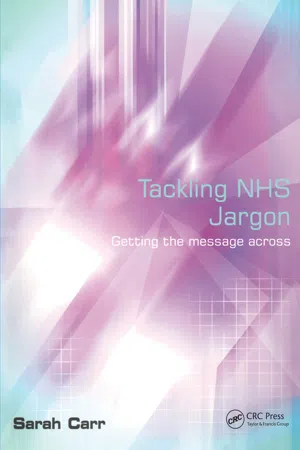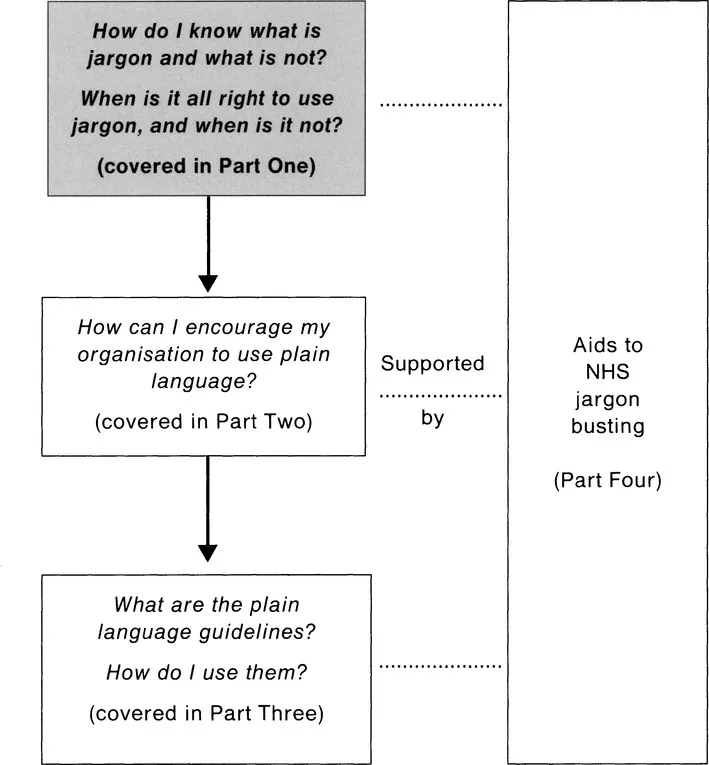
- 200 pages
- English
- ePUB (mobile friendly)
- Available on iOS & Android
eBook - ePub
About this book
Used properly jargon can be effective, but used incorrectly it can damage communications, waste time and money, and harm public, patient and staff relations. This book will enable and encourage readers to use language that the intended audience will understand. It provides practical advice based on the author's experience of producing National Health Service documents and contains explanations of common NHS jargon, with alternatives. Plain speaking and writing techniques are included, and there are numerous examples from real NHS management communications. This is an invaluable book for Health Service managers, clinicians with management responsibilities and all those responsible for communicating information about healthcare.
Information
PART ONE
NHS JARGON

CHAPTER 1
RECOGNISING AND CATEGORISING NHS JARGON
‘Management-speak and gobbledegook are still rife in NHS documents. Poor communications still baffle patients and waste huge amounts of taxpayers’ money.’1
Chrissie Maher, Founder-Director, Plain English Campaign
‘Consult any National Health Service document nowadays and you will read of how “Government-wide agencies will provide effective services for all who benefit” and where “changes will need ownership of the guiding values … a shared understanding within and across agencies and stakeholders”.
…Little wonder, that with their [public sector managers’] eyes fixed firmly on creating their “cross-agency, cross-sector umbrellas", their projects should flounder in incompetence.’2
James Le Fanu, general practitioner and medical columnist
‘We held public meetings fronted by GPs… At each meeting, three major problems were identified: communication, communication and communication. “You don’t use our language.” “You don’t answer our questions.” “You don’t give us information in the right way.” These same criticisms are made time and again in other surveys, in reviews and in public and internal inquiries. They were made after Hillsborough, after Dunblane, after the Piper Alpha disaster. They have been made in dozens of inquiries into shortcomings in systems, from health to education to sport.’3
Hilary Spiers, Head of Communications, Cambridgeshire Health Authority
No one has anything good to say about NHS jargon. Members of the public complain it makes NHS communications hard to understand. NHS workers not involved in management find it confusing and alienating. Managers in partner organisations struggle to understand it. And those new to NHS management (such as management trainees, clinicians gaining management responsibility and new non-executive members) take time to learn it.
But what exactly is jargon? Is it just one thing, or several? And is it always such a bad thing?
TYPES OF JARGON
The word ‘jargon’ comes from an old French word meaning ‘the twittering and chattering of birds’. It came into English in the fourteenth century, when its meaning was extended to include ‘meaningless talk’ or ‘gibberish’.
The Longman Dictionary of Business English defines jargon as:
‘(1) language, written or spoken, that is difficult or impossible for an ordinary person to understand because it is full of words known only to specialists
(2) language that uses words that are unnecessarily long and is badly put together.’4
Many linguists believe that the word ‘jargon’ would be best reserved for the first of the two definitions above. Some people also refer to this as ‘technical jargon’ or ‘shop talk’.
There have been many suggestions for words to describe the second type of jargon. The most popular today is probably ‘gobbledegook’, originally an American word thought to echo the sound of turkeys. Alternatives used over the years include ‘bafflegab’, ‘bureaucratese’, ‘officialese’, ‘doublespeak’, ‘stripetrouser’ (a lovely term invented by George Orwell) and ‘FOG’ (frequency of gobbledegook).
A third type of jargon – buzz words and phrases – is also rife in the NHS. This fashionable jargon varies between areas of work, but is similar across public and private sector management.
This book uses the terms ‘technical jargon’, ‘gobbledegook’ and buzz words’ to differentiate these three main types of jargon – and ‘jargon’ as a generic word to cover all of them. (If you read other work on jargon, remember that other writers may use these terms with slightly different meanings.)
CATEGORISING JARGON
It is important for NHS communicators to be able to:
- recognise jargon (so you can be aware when you or others are using it)
- understand how each of the three types of jargon – technical jargon, gobbledegook and buzz words – behaves (so you will know when to be watchful for each)
- differentiate between the three types of jargon (since there are different ways of tackling each).
TECHNICAL JARGON
Technical jargon is equally common in writing and in speech (both planned and spontaneous). In NHS management, it usually falls into one of the categories shown in Box 1.1.
Box 1.1 Categories of NHS technical jargon
- Bodies – names of specific bodies (e.g. ‘Commission for Health Improvement’, ‘Health Development Agency’); or types of body (such as ‘clinical directorate’, ‘primary care trust’)
- Staff groups (for example ‘nurse consultants’, ‘professionals allied to medicine’, ‘general dental practitioners’)
- Posts (e.g. ‘Caldicott guardian’, ‘complaints convenor’)
- Care types and services (such as ‘outpatient’, ‘daycase’, ‘community pharmacy’, ‘general medical services’)
- Documents – names of specific documents (for example Our Healthier Nation: a contract for health’, and ‘The New NHS: modern, dependable’); or types of document (such as ‘White Paper’, ‘Green Paper’, ‘executive letter’, ‘health service circular’)
- Acts of Parliament (e.g. ‘the Mental Health Act 1983’, ‘the Disability Discrimination Act 1995’)
- Clinical specialties, conditions and treatments referred to in management communications (for example ‘ophthalmology’, ‘myocardial infarction’, ‘nicotine replacement therapy’)
- Initiatives, programmes and approaches (such as ‘Sure Start’, Investors in People’, Integrated care pathways’)
- Concepts (e.g. ‘bed blocking’, ‘case-mix’, ‘clinical governance’, ‘earned autonomy’)
- Processes and activities (such as ‘benchmarking’, ‘commissioning’, ‘personal development planning’)
- Measures and standards (for example ‘standardised mortality ratio’, ‘chartermark’, ‘finished consultant episode’, ‘external financing limit’)
- Funds and budgets – specific funds (e.g. ‘the New Opportunities Fund’); or types of budget (such as ‘non cash-limited’)
In other words, words and phrases that fall into the category of technical jargon are official names for things. Although plain English experts recommend being sparing with capital letters at the beginning of words, technical jargon terms are the sort of words that many people feel should start with capitals. You would not find them in an ordinary dictionary. You can see more examples of this type of jargon in Part Four (in ‘Examples of NHS technical jargon, with plain English explanations’).
Technical jargon sometimes uses words that are in themselves ordinary, but which are used in a certain profession to mean something much more specific. For example, the word ‘bed’ is an everyday word, with an apparently straightforward and obvious meaning. But the Value-for-Money Unit of the NHS Directorate at the Welsh Office defines it specifically as:
‘a device or arrangement that may be used to permit a patient to lie down when the need to do so is a consequence of the patient’s condition rather than a need for active intervention such as examination, diagnostic investigation, manipulative treatment, obstetric delivery or transport.’1
Many pieces of technical jargon are often shortened to acronyms or abbreviations, particularly in speech. This makes it doubly difficult for the uninitiated audience to work out what is meant. (Acronyms are abbreviations that are pronounced as a word, for example ‘NICE’ [National Institute for Clinical Excellence]; abbreviations are pronounced as a series of letters, for example ‘FCE’ [finished consultant episode].)
GOBBLEDEGOOK
For most NHS communicators, true gobbledegook is a feature of written language only (or of spoken language that has been prepared in writing and then read out). It is perhaps the most common form of jargon, which may explain why plain language guidelines focus on written language.
Gobbledegook contains many:
- long and often unusual words, including foreign ones (especially Latin, for example ‘ad hoc’, ‘Inter alia’, ‘modus operandi’, ‘prima facie’)
- abstract nouns (words describing intangible things as opposed to material objects), for example ‘activity’, ‘process’, ‘assessment’, ‘approach’. These are often combined with other nouns and adjectives (words that describe nouns) into long ‘noun phrases’, for example ‘an environment of an economy of scale service delivery, and interactive health-related scenarios’.
You will find gobbledegook words and phrases in an ordinary dictionary. In fact, people who use gobbledegook sound like they have swallowed one. You can see more examples of words that are common in gobbledegook in Part Four (see ‘Examples of NHS gobbledegook, with plain English translations’).
Unlike the other two types of jargon, however, gobbledegook does not just involve individual words. You can recognise it too by the overall style, which typically:
- includes many long sentences (of 25 words or more)
- has complex structures (both for ...
Table of contents
- Cover
- Title Page
- Copyright Page
- Table of Contents
- Preface
- User's guide
- Dedication Page
- Part One NHS Jargon
- Part Tow Jargon and the organisation
- Part Three Plain Language Guidelines
- Part Four Aids to NHS jargon busting
Frequently asked questions
Yes, you can cancel anytime from the Subscription tab in your account settings on the Perlego website. Your subscription will stay active until the end of your current billing period. Learn how to cancel your subscription
No, books cannot be downloaded as external files, such as PDFs, for use outside of Perlego. However, you can download books within the Perlego app for offline reading on mobile or tablet. Learn how to download books offline
Perlego offers two plans: Essential and Complete
- Essential is ideal for learners and professionals who enjoy exploring a wide range of subjects. Access the Essential Library with 800,000+ trusted titles and best-sellers across business, personal growth, and the humanities. Includes unlimited reading time and Standard Read Aloud voice.
- Complete: Perfect for advanced learners and researchers needing full, unrestricted access. Unlock 1.4M+ books across hundreds of subjects, including academic and specialized titles. The Complete Plan also includes advanced features like Premium Read Aloud and Research Assistant.
We are an online textbook subscription service, where you can get access to an entire online library for less than the price of a single book per month. With over 1 million books across 990+ topics, we’ve got you covered! Learn about our mission
Look out for the read-aloud symbol on your next book to see if you can listen to it. The read-aloud tool reads text aloud for you, highlighting the text as it is being read. You can pause it, speed it up and slow it down. Learn more about Read Aloud
Yes! You can use the Perlego app on both iOS and Android devices to read anytime, anywhere — even offline. Perfect for commutes or when you’re on the go.
Please note we cannot support devices running on iOS 13 and Android 7 or earlier. Learn more about using the app
Please note we cannot support devices running on iOS 13 and Android 7 or earlier. Learn more about using the app
Yes, you can access Tackling NHS Jargon by Sarah Carr in PDF and/or ePUB format, as well as other popular books in Medicine & Public Health, Administration & Care. We have over one million books available in our catalogue for you to explore.